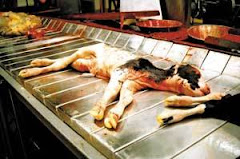This afternoon the world is will never be as sweet as it was this morning: My Sweet Precious Lucy has passed away. Leaving me totally heartbroken.
Three weeks ago I noticed that Lucy's lymph nodes under her chin were very swollen. In my mind I'm thinking she must have an infection so I take her to be examined by her Vet at West Penn Animal Hospital. Turns out that all of Lucy's lymph node were swollen. Long-story-short she was diagnosed with Lymphoma, devastating news. At that time she still had a good appetite and was still enjoying life so I thought we had a few months left to be together however that was not to be. Three days ago she started to exhibit signs of physical decline. By this morning the 'spark' had faded from her eyes. She had lost interest in food ( Lucy lived for two things, me and food) plus she started throwing up. I phoned my sister to see if she would come with me to the Vet's office, she then phoned her veterinarian's office to make the arrangements for me because her vet was closer than Lucy's. Lucy suffered from a sever case of Motion Sickness and I didn't want her last ride in a car to make her feel even sicker.
I wanted to speak with the vet to make sure I making the right decision, maybe it was too soon? Oh how one hopes against hope at times like this. If there was any way possible to keep Lucy with me longer I wanted to do just that. After the examination it was the veterinarian's opinion that I should let her go. I loved her so much so I had to do what was best for her.
I sat on the floor with her on my lap and held her in my arms while the Vet started the IV. I did all of the things that was familiar to Lucy, I kissed her face, her eye lids, I kissed her head and ears all the while telling her how much I love her, these were all words that were familiar to her. Every day for seven years I told her that I loved her and I kissed her face every day too. I told her how much joy, comfort and happiness she brought into my life, told her that she is a wonderful friend and how I wish could be with her to take her were ever it is that one goes when one dies. I know this is silly but I hated the thought of her having to take that journey. Lucy was such a needy, baby-like dog. I called her my 'Velcro Dog' because she was always wanted to be smack up against me and she hated to be alone.
I've worked in health care all of my adult life, since the age of 18. I have seen death many, many times. I've washed, shrouded and escorted to the morgue many people who've passed away, yet I still find death to be so very mysterious and so lonely.
The vet flushed Lucy's IV with saline, then gave her a sedative I feel her body relax in my arms. I continued to stroke her silky smooth fur while continuing to talk to her as the vet administered the 'euthanasia'. I then felt the 'life' leave her body. The vet listened to Lucy's heart with the stethoscope until her heart stopped beating.
There are no words which antiquity describe that awful, lonely, empty feeling of profound loss, words fail miserably.
I couldn't bring myself let Lucy go so the staff let me stay in that empty cold room with my Lucy. I sat on the cold floor with her still in my arms. For a while I tried to pretend that she was just asleep. I hugged and rocked her with my face buried in her neck, smelling in her scent trying to imprint her scent into my memory I rocked like she was baby...she was my baby. I finally left when her body started to lose it's warmth.
Lucy helped me get through a long series losses. I needed her so much more than she needed me. She was a sweet, funny, babish scaredy-cat girl. She always had to sleep smack up against me and Lucy loved to sleep burrowed under the covers, she would get under then turn around three times thereby bunching up and hogging the covers. I always referred to her as my 'Velcro' dog. Lucy 'loved' with total abandon, she held nothing back. I believe we could learn a lot from dogs, Like how to live 'in the moment', how to truly love, how to forgive. Losing her is devastating. I have Girl, my son's Boxer to help me through this. She's more reserved and 'Lady-like than Lucy was but she is a kind, loyal and gentle soul and I love her too. Even so, there's that place in my heart that belongs to Lucy and will always remain empty. I hope she not alone, I hope she's not scared and lonely or cold and hungry. I will get Lucy's ashes in a ceder box with her named engraved on a plaque in a week or so . I will keep her ashes on her pillow, on my bed where she slept in life.
Lucy her warm brown eyes that always expressed so much love.



Lucy
2/1/2003 - 4/18/2010
I MISS YOU.
_______________________________________________________________________
THE CANINE BEHAVIOR SERIES
By Kathy Diamond Davis
Author and Trainer
Grieving the Loss of Your Dog
Whenever we experience grief, past losses come back to our minds and hearts. Grief is like an illness or injury, with an acute stage that heals but still leaves us forever changed. Proper care during the acute stage can lead to better healing and perhaps even a strengthened ability to heal from future grief.
When for some reason healing doesn’t go well, people can be left more vulnerable to serious emotional problems at times of future losses and at emotional times such as holidays. Because of this vulnerability, it’s important to take every opportunity with any loss to come through it to peace of mind and intact good memories. This is true whether the loss is a human loved one, a job, a disability, a disaster that destroys your home, or the loss of a beloved dog.
One fact about life on earth is that it will bring losses. We need to stand by each other at these times, both for the sake of the grieving person and for our own sakes. You may be one who has trouble accepting help from others, but please make an exception at times of grief. You may need some time alone, but you also need support from other humans who can relate to your experience.
Even a little bit of this support coming at the right moment can make a huge difference in a person’s future ability to cope with grief. It’s easier to accept the help when you have taken your turn providing it for others. Sometimes the person in place when we need a moment of understanding from another human being is a close friend. Plenty of times, though, it’s someone you encounter online, at your job, or when out doing errands.
Most of us have opportunities from time to time to lighten other people’s burdens, and this is a vital one. Other humans throw plenty of stress at us, so when you have a chance to give or receive positive support from another person, act on it. You will be stronger for the experience and so will the other person.
You can help yourself cope with grief at the loss of a dog better by doing certain things. You may also be able to help someone else by passing on the information. Exactly how each person decides to do things is up to him or her. What’s important is to make decisions that will aid your peace of mind and healing.
Get the facts. Don’t hide from a diagnosis. At this point in time, it is still the dog owner’s choice about whether to authorize a particular treatment. Laws may change that, if “guardian” replaces “owner.” Some people want to see government take over medical choices for our dogs, but for now in the United States you can confidently take your dog to the veterinarian for an assessment of the dog’s condition without fear that anything will be done against your wishes.
Sometimes people don’t understand this and fear taking their suffering dog to the veterinarian for help. In the process, the people suffer, too—potentially for the rest of their lives, knowing they failed to help their dogs.
You will be glad you got accurate information so that your veterinarian can help you make the dog as comfortable as possible for as long as possible. With a diagnosis, your decisions will be based on reasonable knowledge of the expected outcome.
Write down your questions before talking with the veterinarian, and take notes as you get the answers. This works a lot better than relying on memory later to make sense of things you heard while feeling stressed about your dog. Your notes will also help you explain the veterinarian’s diagnosis to other family members.
Take the time to do things in an orderly way. Feelings of grief are easier to endure before the loss than after, if the dog can be comfortable. It also gives you time to have a loving good-bye that will become a good memory.
If the dog is suffering, provide relief for that suffering. Realize that dogs have a survival instinct to hide their pain, so you have to be alert for subtle things. When a dog who normally eats well stops eating, that is a big deal. Panting or other restlessness at night, housetraining accidents in a dog who hasn’t had them for years, and signs of separation anxiety are other things to watch for. Many things that cause dogs to suffer can be relieved at least temporarily and give the dog a bit more time of feeling comfortable.
When suffering is no longer being relieved, don’t fall into the common trap of just hoping your dog will die quietly and spare you from making a decision. In many of those cases, it means the owner has made the dog suffer unnecessarily. Ask your veterinarian to help you end your dog’s life at the appropriate time.
When the time comes, some dogs would find it more comforting for the owner to be present and others would not. If you are a skilled handler and can help your dog stay calm, you might forever be glad you did this last loving thing for your dog.
On the other hand, if you are not comfortable being there or your dog is more fractious toward veterinary staff in your presence, it is better for you to step out of the room for the brief moments of the procedure. Veterinarians are accustomed to this sad duty and will perform it kindly.
Think now of the arrangements you want for your dog’s remains, so that when the time comes you will have already decided. Different people have different needs in this aspect of grief. Some want ashes to keep at home, scatter, or bury. Some want nice caskets. Some want headstones and permanent-care pet-cemetery plots. Some want to have the dog’s body preserved. Some want a minister or other person to conduct a funeral or memorial service for the dog.
We all need to just respect each other’s feelings about how the dog’s remains are handled. Support someone else’s decision even if it’s wildly different from yours. How this is handled can greatly help people heal from the grief.
There may be other people who love your dog. Keep your friends and extended family members informed about what is happening. Talk to those who are close to the dog about what each of you feels and wants in the dog’s care, being present at euthanasia, and the remains.
The costs of a dog’s last illness can be high, and we need to prepare for that much earlier in the dog’s life. Things can happen at any time. An ideal option is to have money in a savings account available for the dog’s expenses. Another way is to keep a credit card open enough to cover the dog’s medical needs.
You’ll want to discuss finances in advance with others in your life who share that responsibility. But don’t try to anticipate a dollar amount or to make your decisions—especially early in the illness—based on money. Instead, carefully listen to all the information (taking notes), and make your decision based on what you think your dog would want if your dog could know what you know about the whole situation.
The financial aspects become much clearer when you put the dog’s welfare first. Others involved in paying the costs may be more supportive if they are consulted in advance rather than having it “sprung” on them at the last minute. They are also more supportive if they have been included in decisions about the dog from the beginning of your lives together. Too often, people do too much or too little for the dying dog, and regret it ever afterward. Talking things over as a family can help you avoid this.
Watch for the right moment when both parties feel like talking. Emotionally, a good way to approach it may be in several brief conversations rather than one intense session that doesn’t give people time to think about what they want and to process their feelings before talking again.
Time really does help. So don’t wait until the last minute. Don’t assume you know how the other person feels or what the other person wants. You can be stronger as a family from handling this situation well together. Communication is a skill, and communicating well about something as hard as the death of your dog will give you increased confidence that you can count on each other.
If you are not the dog’s primary human, but that person is your loved one and needs your emotional and financial support to deal with this situation, think carefully about everything you decide and say. This is not the time to make any kind of power play or penalize the person in some way. This is the time to be there for those you love. If you are not quite as close to the dog, you may have valuable observations that the dog’s closest human is just too upset to see, such as behavior changes indicating the dog is in pain.
Time
When a dog is dying, the dog probably doesn’t know that. A dog lives until he or she dies. We humans do well when we do the same and make the best use of the time we are given. Time is always limited. It’s wise to think about your dog’s whole life and how you are going to care for that time when you first decide to get a dog.
The pain of grief and the costs in money and energy make up the price we pay for the love of our dogs. It is a bargain, but it is a high price. Planning well ahead can help us avoid letting our dogs down just when they will need us most.
When a person has had to make the agonizing choice to put a dog to sleep, the most healing words you could say are “You did the right thing.” Don’t say it if you don’t believe it. But if you do believe it, those words will help.
Our dogs love us with their whole selves. One who loves us wants the best for us, and your dog would want you to heal from grief and be able to fully love again. In a mysterious way, you can even love more deeply for knowing the cost—and the value—of love. People often find their love for the departed one continues to grow.
Love is infinite and powerful. You don’t run out of love like a bucket becoming empty. The more you love, the better you get at loving—it’s like a muscle that grows stronger with good use. Your relationship with your next dog can be even better, if you will let it. Everything you learned from loving the dog who has left you can bless your next dog.
Some people are ready for another dog right after a loss, but many need some time to grieve. For various reasons, you may decide to refrain from getting another dog. This is a decision to think about and discuss with the family long in advance of grieving for your dog. Picking a dog you can be responsible for over the next 10 to 15 years is a huge decision. Grieving people should avoid big decisions whenever possible.
It saves a lot of pitfalls to decide as much as possible about your next dog long in advance of your dog having any terminal illness. That doesn’t mean you can’t change your mind when the time comes. But it can greatly help you through the loss, and we should never underestimate the impact of grief. It can bring on many problems. It is important to handle it carefully.
Be good to yourself during grief and do the same for anyone around you who is going through it. Don’t say “I know how you feel”—you can never know just how someone else feels. You might say something like “I can only imagine how you must feel.”
Most of all, just be there and let the person express feelings, including tears. Tears are the work of grieving. Take time to do that work for your own grief. You can come through grief with a greater joy in life and a greater appreciation of love. That is a gift your dog would want to give you.
Date Published: 12/17/2006 11:50:00 AM

































